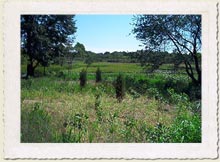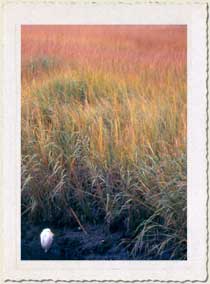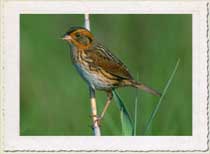
Four Sparrow Marsh Preserve
Borough: Brooklyn
Acres: 63.37
Habitat Type: Salt Marsh
Named by naturalists Ron and Jean Bourque, Four Sparrow Marsh Preserve is home to four native species that require undisturbed marshland for nesting: Sharp-tailed (Ammodramus caudacutus), Seaside (Ammodramus maritimus), Swamp (Melospiza georgiana), and Song Sparrows (Melospiza melodia). Because of its relative isolation from residential areas in Brooklyn, Four Sparrow Marsh Preserve has been allowed to remain in a fairly natural condition. This makes it ideal for many permanently nesting species, including several types of ducks, gulls, wading and woodland birds, as well as for the common seashore mollusks and crustaceans which those birds feed on. Rare birds are often sited in the grassy salt marsh, including bobolink (Dolichonyx oryzivorus ), common snipe (Gallinago gallinago ) and little blue heron. (Egretta caerulea ).
As the larger and older of the two remaining salt marshes on the north shore of the Jamaica Bay estuary system, Four Sparrow Marsh serves two critical roles besides nesting habitat. It is a rest stop for up to 326 species of migrating birds on the Atlantic Flyway, and acts as a “kidney”, filtering pollution and excess nutrients from the Bay. Four Sparrow Marsh Preserve contains several types of habitats besides salt marsh, including low brush; deciduous forest consisting mainly of cherry, elm, locust, poplar, sumac, and willow; open meadow; intertidal mudflat; and high clusters of reed species. The open meadow is largely covered with mugwort (Artemisia vulgaris, an aggressive, exotic species common in landfilled areas.
In the spring of 2004, Parks’ Natural Resources Group completed a three acre salt marsh restoration project at Four Sparrow Marsh. The restoration project included restoring tidal flow to previously filled areas and planting salt marsh cordgrass (Spartina alterniflora). One acre of adjacent woodlands, which serve as an important buffer to the marsh, were also restored.
Photographs
Directions
Four Sparrow Marsh is not currently accessible to the public.


